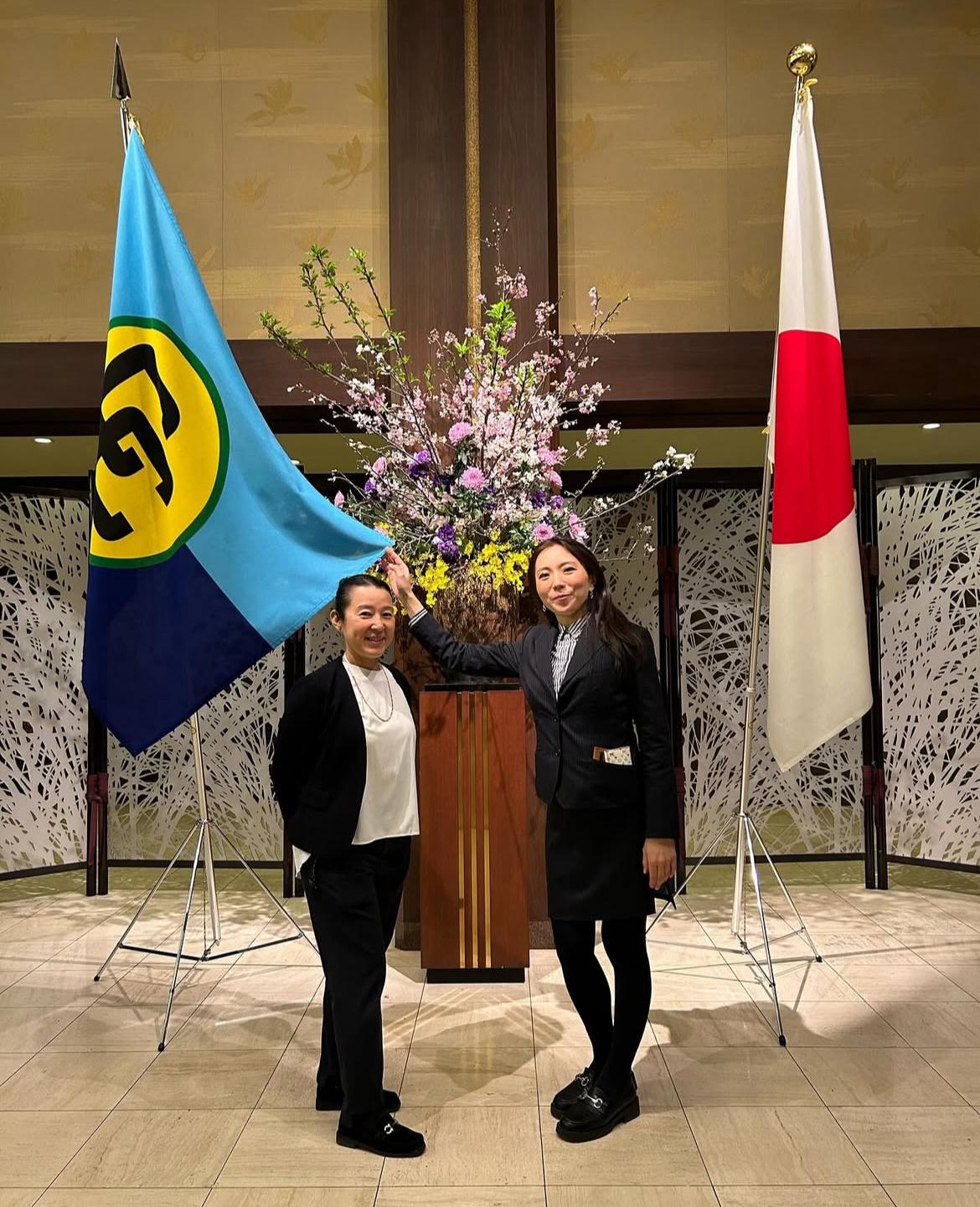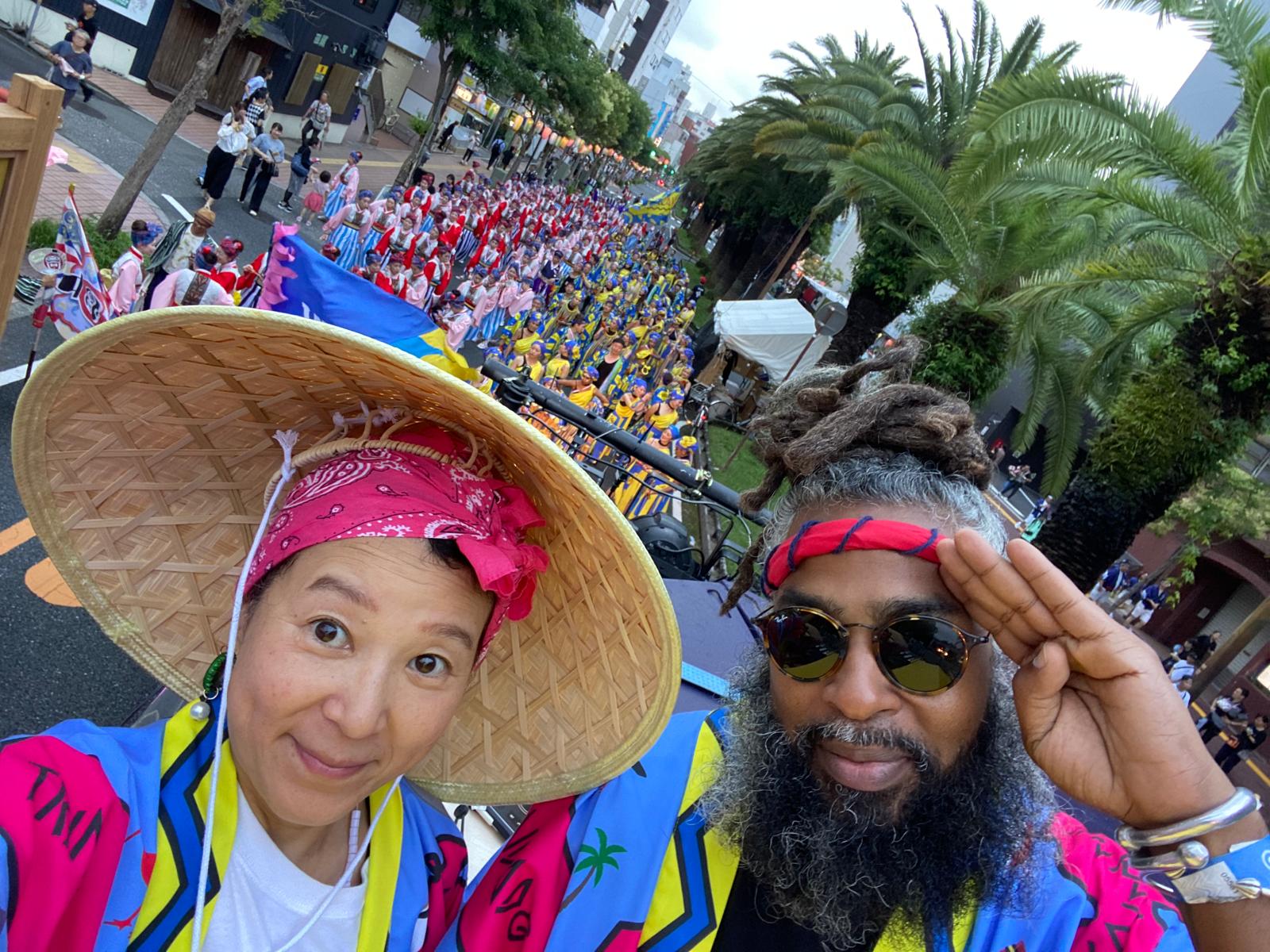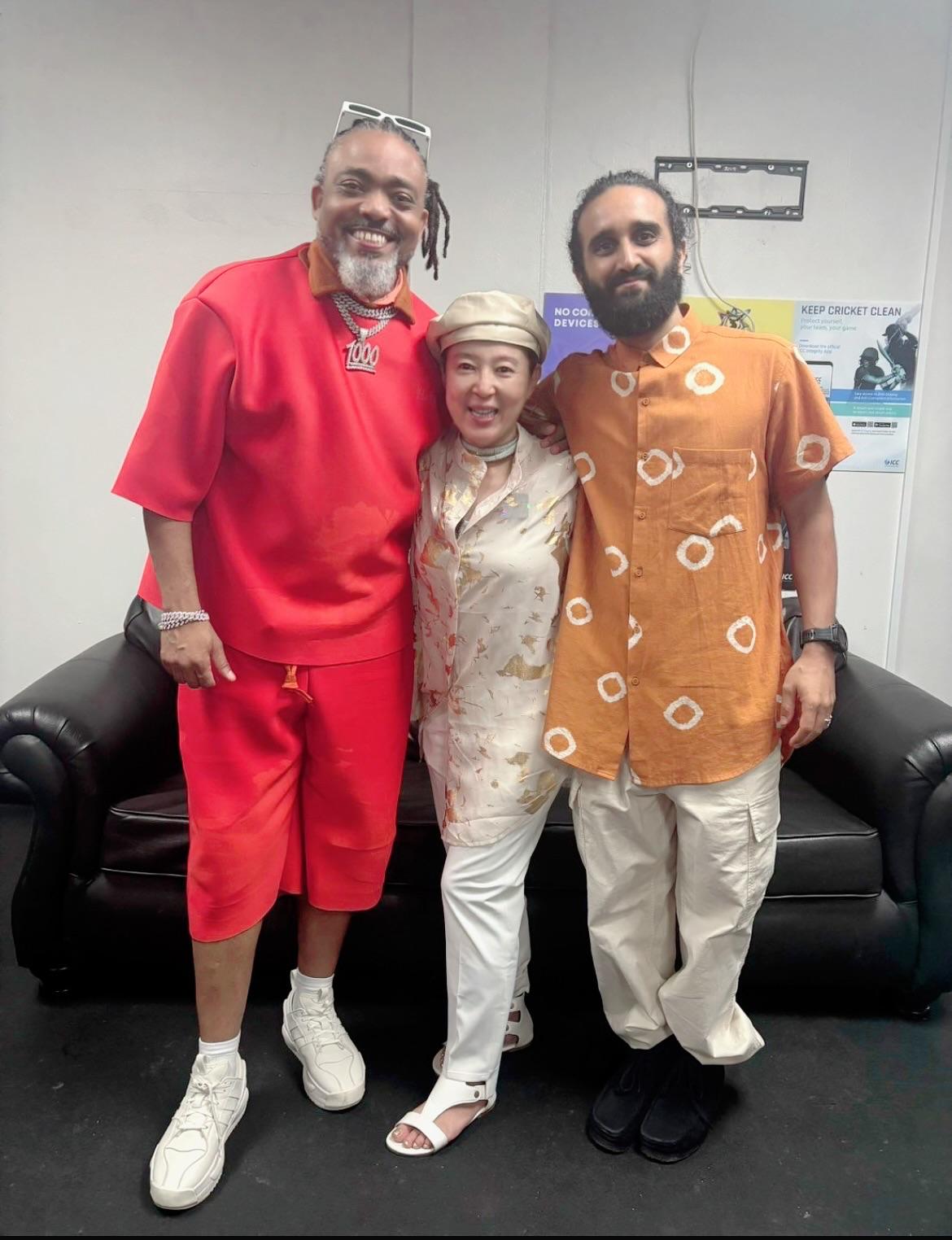By Cherisse Moe, HER Magazine

20,000 Japanese masqueraders and close to one million onlookers took to the streets of Kochi City this month to celebrate the 72nd anniversary of Japan’s Kochi Yosakoi Festival. The summer affair, staged at 16 venues around the city, transforms into a kaleidoscope of colours, elaborate costumes, music and choreography, from August 9 to 12. A cornerstone of Japanese culture, it symbolises hope and post-war renewal.
At its heart were Tomoko Inoue, a Kochi-born DJ and producer known as Selector HEMO, and Yuri Kodera, her Osaka-native business partner, whose Trinbagonian-inspired Carnival band CANAVALAVA continues to make a bold statement being the only band to feature soca, steelpan, an engine room, and chutney music with traditional Japanese Yosakoi traditions.
Since founding CANAVALAVA in 2020, Inoue’s 17-year love affair with Trinidad’s Carnival culture—sparked by her first of 25 visits—has left its mark on Japan’s festival, drawing 150 revelers this year—the maximum number of participants allowed per band.
The duo also founded LIME records, a music label and event production company, while operating ilovetrini.net, a media platform, introducing various aspects of Trinidad and Tobago to Japanese audiences.
In this exclusive WhatsApp interview, both Tomoko and Yuri excitedly shared their vision for deepening this Japan-Trinidad bridge and strengthening bilateral relations between both countries.
Q. Her Magazine: What was it about Trinidad and Tobago’s Carnival that captured your heart? How did that experience inspire you to start your own Carnival band in Japan?
A. Tomoko Inoue: When I first experienced Trinidad Carnival in 2000, I was deeply moved by its overwhelming sense of freedom and joy. It was a space where everyone could shine as their true selves, transcending race and generations, coming together as one. I was struck by how similar this was to the Kochi Yosakoi Festival, the major festival from my hometown. In that moment, I knew I wanted to create a carnival band that would mix these two festivals. This vision led me to form a band in 2008. In the early 2000s, soca artists such as Kevin Lyttle, Rupee, and Dawg-E-Slaughter came to Japan, and I had the opportunity to perform alongside them at events. That was Japan’s very first authentic soca party, and it marked the beginning of my journey to introduce Carnival culture to Japan.
Q. Her Magazine: What prompted your first visit to Trinidad and Tobago?
A. Tomoko Inoue: My very first trip was thanks to meeting a Trinidadian in a Tokyo nightclub where I was DJing soca music. He invited me to visit his homeland and even offered his family’s home for me to stay in. That homestay marked the true beginning of my journey, and it has continued ever since. Each visit brings new encounters and inspirations, fueling my music career. The bonds I have built with people in Trinidad and Tobago have become an irreplaceable treasure in my life.
Q. Her Magazine: Tell us about this year’s Kochi Yosakoi Festival. What was the vibe like? How did masqueraders respond to soca on the road?

A. Tomoko Inoue: The entire city was filled with music and colour, with people dancing day and night—it truly felt like life itself was a celebration. Soca music began to be introduced more prominently in Japan around 1999, mainly through radio and live events. Although still a relatively new genre, we have continued promoting it for over 25 years. Recently, more people have been exposed to soca through the Yosakoi Festival, fitness, and various events. When LIME records invited Trinidadian artists such as KES The Band, Machel Montano, Bunji Garlin, Fay-Ann Lyons, and Muhammad Muwakil from Freetown Collective to Japan, audiences who experienced their live performances became truly captivated and many turned into passionate fans. Seeing people surrender themselves to soca, dancing and smiling, convinces me that the genre is steadily growing here. For the general Japanese audience, songs like Palance and Turn Me On are the most recognisable soca. Among music fans, songs like Carnival are very popular, along with tracks by Japanese soca artists such as Romie and Barbie Japan.
Q. Her Magazine: Are there any other aspects of Trinibagonian culture that are
now infused into Japan’s Festival?
A. Yuri Kodera: Japanese festivals themselves have a long history and tradition. CANAVALAVA has grown to integrate Carnival elements such as Old Mas and Mas costumes into Japanese festivals, and we now even invite artists directly from Trinidad and Tobago. What started as a cultural introduction has evolved
into a movement that goes beyond music.

Q. Her Magazine: The steelpan has grown in popularity in Japan over the years. Can you tell us more about that?
A. Yuri Kodera: The steelpan is an essential part of CANAVALAVA. Since 2008, we have incorporated it into our performances. Its unique sound instantly transports people in Japanese cities into the atmosphere of Trinidad and Tobago. More and more Japanese musicians have embraced the instrument with passion, and today there are steelbands all across Japan. Our distribution of the film PAN! Our Music Odyssey in Japan also greatly contributed to the spread of steelpan. Many people first discovered the instrument through this film, and some even began learning it after watching.
Q. Her Magazine: Do you already have plans for next year’s edition of Kochi Yosakoi? Any deets you can share with us?
A. Yuri Kodera: Yes, planning has already begun. While we cannot reveal details yet, our vision is to further evolve into a true collaboration between Japan and Trinidad & Tobago. We aim to create a space that offers audiences diverse forms of expression and fresh experiences. We are also working toward realising a performance by CANAVALAVA at Trinidad Carnival 2026. This would involve collaborating with Assistant Professor La Shaun Prescott from UTT, who served as a joint choreographer for us this year, along with her students. Such a project would represent a powerful form of cultural exchange. Given the great distance and expense of traveling from Japan, we have already started discussions with the Trinidadian government for support with accommodation and logistics. It would be a dream come true to perform together on that stage. We would also like to welcome any potential sponsors or supporters who may be interested in contributing to this project.
Q. Her Magazine: As we close, we have to ask: have you picked up any Trini slang? What’s your favourite?
A. Tomoko Inoue and Yuri Kodera: Our favourite slang is definitely lime /liming! It inspired the name of our company LIME records.
